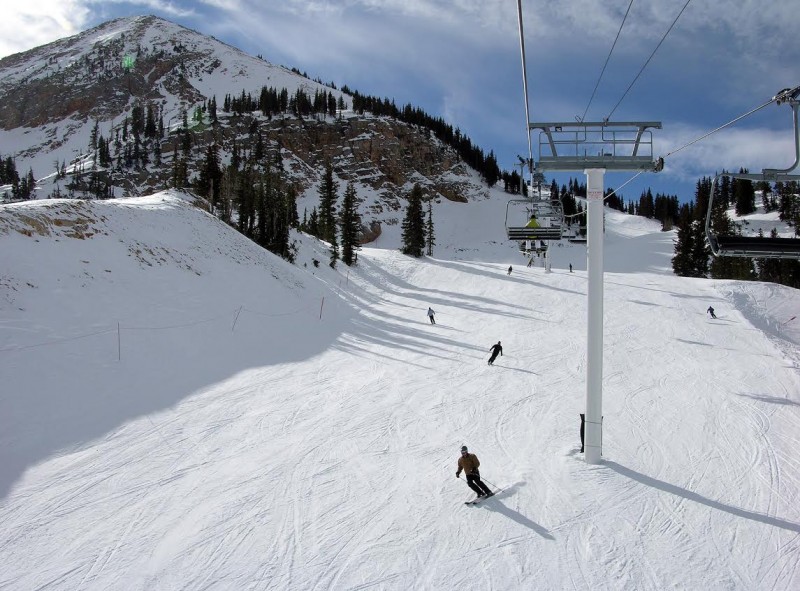
Snowboarders are seeking to halt Alta's ban on boards. Image courtesy of Alta.
A group of snowboarders filed suit against a Utah ski area and the U.S. Forest Service in an attempt to get the resort to drop its ban against boarders.
On January 15, nonprofit Wasatch Equality and four individual snowboarders filed a lawsuit against Alta Ski Area and the Forest Service, seeking to permanently enjoin Alta from enforcing its anti-snowboarder policy and snowboarding ban.
The plaintiffs also seek a declaration from the Court that Alta’s snowboarding prohibition, as enforced by the Forest Service, violates the Fourteenth Amendment to the United States Constitution and is therefore unlawful.
“Alta is one of only three ski resorts in the United States that does not allow snowboarding, and Alta is the only one of these resorts that is operated on public land controlled by the Forest Service,” said Attorney Jonathan Schofield in a statement. “Because of Alta’s relationship with the government, Alta’s actions must comply with the Constitution’s Equal Protection Clause.
“Alta’s prohibition against snowboarders excludes a particular class of individuals from use and enjoyment of public land based on irrational discrimination against snowboarders, which denies them equal protection under the law as guaranteed by the Fourteenth Amendment.”
According to a release from the group, Alta operates under a Forest Service permit, which specifically states the public lands “shall remain open to the public for all lawful purposes,” yet Alta’s refuses to allow certain members of the public from using its land.
The complaint alleges when Alta set forth its snowboarder ban in the mid-1980s, its policy was initiated as a result of animus held by Alta’s ownership, management, and customers toward snowboarders, and that Alta continues to enforce its ban based on this animus. The complaint further alleges the reasons offered by Alta in support of its policy are a pretext and there is no legitimate reason for Alta and the Forest Service’s continued denial of access to one group of people (snowboarders) while granting access to a similar group of people (skiers). Thus, according to the complaint, Alta’s anti-snowboarder policy and snowboarding ban cannot be enforced.
“Snowboarding and skiing are wholesome, family-friendly activities, and there is no reason why they cannot coexist,” said Drew Hicken of Wasatch Equality. “We feel that it is time for Alta to let go of outdated prejudices that perpetuate a skier-versus-snowboarder mentality and allow everyone, regardless of whether they are skiers or snowboarders, to share the mountain together.”
Hicken is one of the snowboarders filing the suit.
An Alta spokeswoman told the Deseret News the resort wants to gather more information before commenting on the lawsuit.
The newspaper reported Alta has not always prohibited snowboarding, according to the lawsuit. It allowed snowboarders to ride its chairlifts in the early 1980s, and Hicken and another plaintiff Richard Varga were among some of the first snowboarders at Alta.
According to the lawsuit, some 85 percent of Alta is on public land.
But not everyone wants to see snowboarders at the Little Cottonwood Canyon resort.
The paper quoted skier Kevin Hurley as saying, “It’s the only place left. Give it to ’em. Snowboarders go anywhere else you want to go, but leave Alta for the skiers. Where we live, we gotta deal with snowboarders, and we’d rather deal with skiers.”
Alta, along with Utah’s Deer Valley and Vermont’s Mad River Glen, are the American ski areas not allowing snowboarding.
Located in the Wasatch Mountains, Alta is about a 45-minute drive from Salt Lake City. The area has 116-plus runs with a summit elevation of 10,550 feet and a vertical drop of 2,020 feet.
 Your Privacy Choices
Your Privacy Choices
 The
The